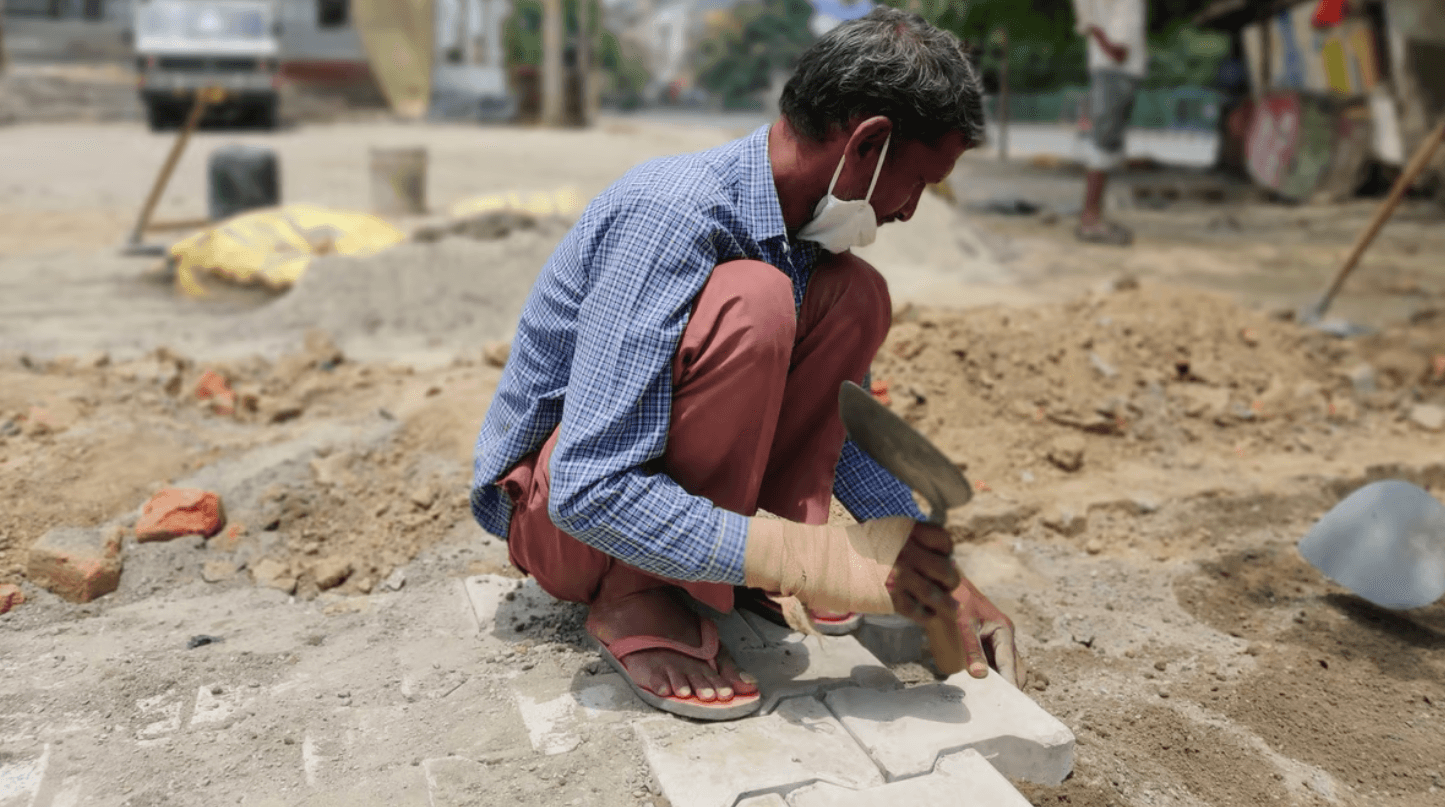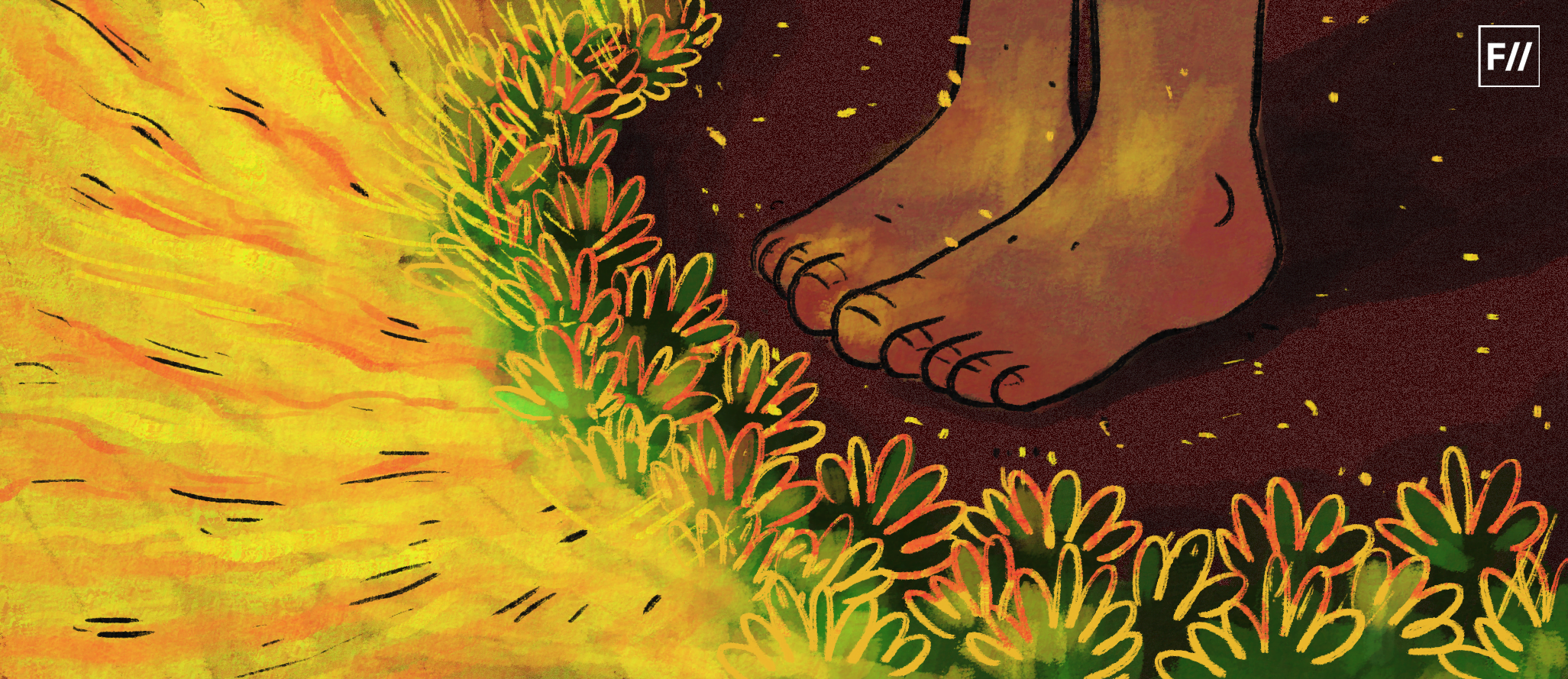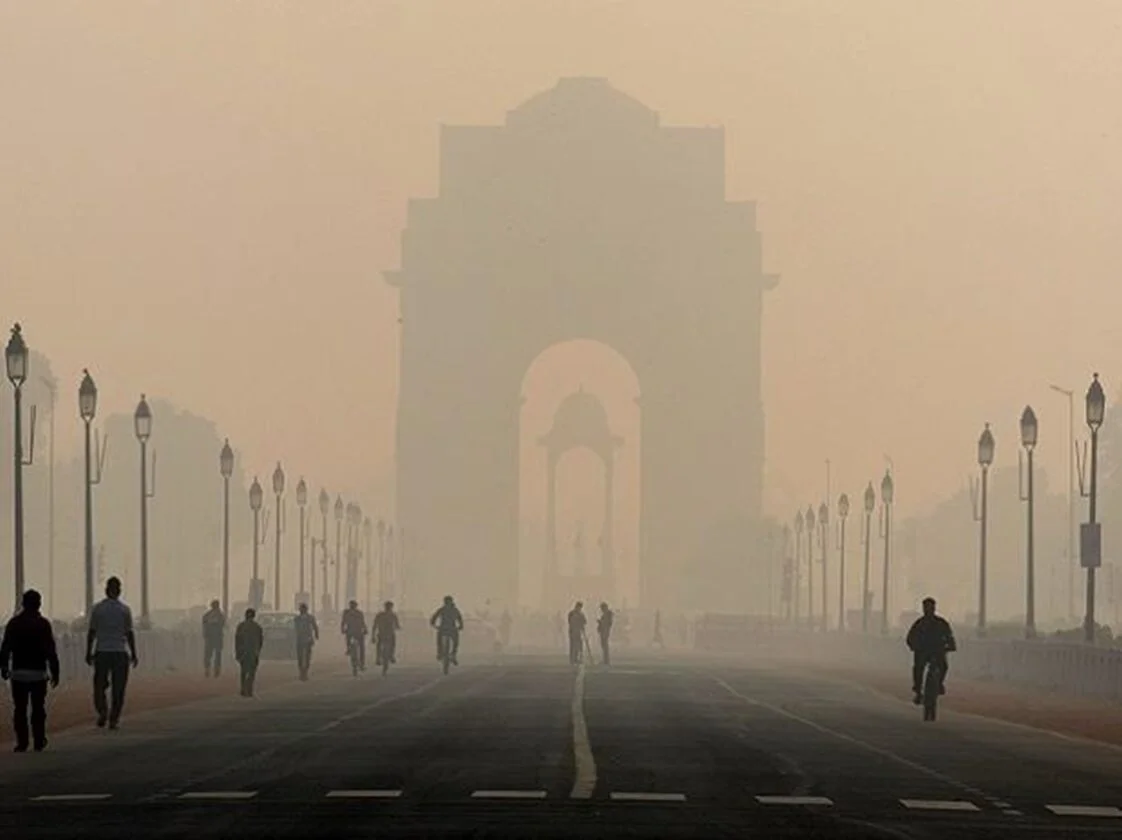According to the economic survey of 2021–22, 43.99 crores of the population worked in the unorganised sector during 2019–20. These workers are usually engaged as daily wage workers and work in an open environment, exposed to all sorts of pollutants, air pollution, water pollution, and climatic conditions to the extent that it gets normalised for them. Different sections acknowledge or adapt to these hindrances differently, influenced also by their situations.
Pollution but the love for Jamna
‘50-60 saal se yahi rehte hai hum,’ (We’ve been living here for 50-60 years), says Krishna Devi.
Krishna Devi talks about her life, living on the Yamuna ghat. She has spent her entire life on those banks, sourcing and selling clothes in Chandni Chowk, which she stopped a couple of years ago due to her health. She remains aloof when asked about the conditions around her place, such as the toxic river and toxic gases and pollution emanating from it. Having lived there for so long, the pollution and climate conditions surrounding the river have become an integral part of her life, so much so that she does not even notice it anymore; those conditions are all she has known.

All the houses on the bank had their backs open to the river Yamuna, and the front doors were stunk. She has been a mother to two sons and a daughter who have all grown up and married off now with children of their own. All of her children went on to be well off financially, one even working in the Indian Air Force, yet she never wished to move out of the ghat.
Krishna Devi is a grandmother now at the age of 60; her sister, a few years younger than her, sits there washing utensils by the groundpump. Her sister adds, ‘Kahi aur mann bhi nhi lagta, kahi bhi jaye, neend toh apne ghar mai hi aati, mann yahi lagta.’ (Nowhere else feels right; no matter where I go, I can only sleep in my own home; my heart feels at peace here.)
Most of the people who lived here had independent businesses or were daily wage workers, whose jobs required them to spend their time exposed to the open and polluted environment for prolonged periods. Krishna Devi and her sister with their families have had to shift for periods of time when the water levels of the river rise. ‘Yaha tak paani chadh jata (she says, pointing to the roof of her house), pichle saal Chadha tha, Narela jana padha tha pure parivar ko, pareshani usme bhi aati, gaea bael leke kaha jaye.’ (The water rises up to here. Last year it rose, and we had to go to Narela with the whole family. It was troublesome, and where would we go with our livestock?) They have resided in different parts of Delhi with relatives but always made their way back to the ghats of Yamuna. Their home is just on the ghats of Yamuna, exposed to fumes, toxic gases, and volatile organic compounds being released into the atmosphere due to pollutants in the water.
Pollution, toxic air, and well-maintained parks of Delhi
In a contrasting situation, Rusa Devi, 30, residing in Dwarka locality of Delhi, migrated from UP in search of work. She has three kids and sells mortar and pestle stone; she moved to Delhi this summer in search of better prospects of earning. ‘Mujhe acha ni lagi yaha, mai wapas jaa rhi hoon 3 din mai. Garmi me aayi thi mai, kama ke wapas ghar jaane, par yaha ka hawa acha nhi hai. Baaki toh kaafi saal se yahi reh rhe, par mujhe nhi rukna yaha.‘ (I didn’t like it here, so I’m going back in 3 days. I came here in the summer to earn money and go back home, but the air here isn’t good. Others have been staying here for many years, but I don’t want to stay here.) She lives on the backside of the Dwarka water supply tank in Sector 20. This Jhuggi, which is behind the tank and was appropriated by the contractor to workers employed on a daily wage basis for different sorts of jobs in the surrounding area, sits in the middle of various recently developed parks for the up-and-coming Omaxe Mall project.

Another woman from the same jhuggi commented, ‘Ab kya kare didi, paet toh bharna hai na, kuch mahina kamate hai fir ghar chale jaate hai, fir wapas aana padta hai. Ab aap aaye ho, aap btao, khasi wagera hoti, aapko pta hai iska ilaaj, sarkar toh nhi deti ya btati koi dawai.’ (What can we do, sister? We have to fill our stomachs, right? We earn for a few months, then go back home, and then we have to return again. Now that you’re here, can you tell me if there’s any remedy for cough and stuff? The government doesn’t provide or tell us any medicine.)
The residents of the jhuggi are primarily employed on a daily wage basis in the parks developed nearby, looking after the sweeping, cutting, throwing, and other menial tasks from 8.30 to 5.30 every morning. On a daily basis, they are exposed to nearby drain water and gases, Delhi’s persistent air pollution, as well as particulate matter and dust, because of the lack of proper safety gear for work.
Day or night, at your gates all the time
Looking into professions with a little better security and wages, the security guards in Dwarka are better aware of the health repercussions they face while attending their 12-hour shifts. A security guard, Ashok, sits at the gate of a society in Dwarka for 12 hours. He is welcoming to everyone who passes and greets them while fulfilling his duties. Upon striking up a conversation about the weather and polluted climates, he interjects, ‘Kya hai pradushan btao? Ye jo parali jalate hai, saari hawa dilli ko hi aani hoti? Aisa thodi hai, sab sara politics ke liye karte ye. Thand hoti uss wajah se hawa baith jaati par itna bada thodi hota jitna ye banadete.’ (What is pollution? When they burn stubble, does all the smoke come to Delhi? It’s not like that; they do it all for politics. The cold weather causes the air to settle, but it’s not as big a deal as they make it out to be.)
The 60-year-old man completely dismisses pollution as a serious matter; he does acknowledge the occasional coughing and breathlessness but blames it on his old age.
The 60-year-old man completely dismisses pollution as a serious matter; he does acknowledge the occasional coughing and breathlessness but blames it on his old age. Ashok used to work in a media publication house earlier, delivering magazines. Years of work and a couple of surgeries later, he sits at the gate, working just to spend his time. He goes on to tell us about retiring 3 years ago when his wife was struggling with cancer; she expired a year ago. ‘Fir ghar baithne ka mann nhi kiya, kitna aram karega aadmi.’ (I didn’t feel like sitting at home; how much can a person rest?)
Being at the age of 60 with no employment or other options, Ashok now spends a 12-hour shift as a security guard exposed to the pollution of Delhi with next to no awareness of its impact on his health.
About the author(s)
Ketki (she/her), is a curious political science student who loves exploring new ideas, places, and cultures. She has gained diverse work experience across event logistics, exhibitor relations, and research, always eager to learn something new. She has a soft spot for cats. In her free time, she loves to travel, listen to wildly different music and watch thrillers.





